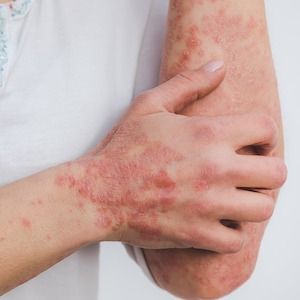News
Article
Deucravacitinib for Psoriasis Effective by Week 1, Sustained Over 52 Weeks
Author(s):
In this analysis, investigators highlighted the results of treating psoriasis with deucravacitinib in the phase 3 POETYK PSO-1 and PSO-2 trials.
Credit: Pixabay

Once-daily deucravacitinib treatment of psoriasis demonstrated may be effective as early as the first week of therapy, according to new findings, with sustained clinical responses observed being maintained over 52 weeks.1
These new data resulted from an analysis of the global phase 3 POETYK PSO-1 and PSO-2 trials. This research was led by Neil J. Kormana, of Case Western Reserve University School of Medicine and University Hospitals Cleveland Medical Center in Ohio.
Kormana and colleagues wrote that a substantially greater proportion of individuals given deucravacitinib therapy were able to achieve the coprimary endpoints of ≥75% improvement from the point of baseline in terms of Psoriasis Area and Severity Index (PASI) improvement and static Physician Global Assessment score of 0 or 1 (clear or almost clear).
“Key considerations with respect to treatment choice for patients with plaque psoriasis include rapid onset of action and symptom relief, as well as long-term maintenance of treatment response,” Kormana et al. expressed. “Here, onset of action and maintenance of response were evaluated in deucravacitinib-treated patients with moderate to severe plaque psoriasis enrolled in the global phase 3 POETYK PSO-1 and PSO-2 trials.”2
Study Design
The investigators’ study looked into data drawn from the 52-week, multinational, randomized, double-blind, active-comparator and placebo-controlled studies known as POETYK PSO-1 and PSO-2. Participants involved in this study were in the age range of 18 years and older with moderate to severe and stable plaque psoriasis for a minimum of half a year, and they were assigned randomly into a 1:2:1 ratio to be given either an oral placebo, apremilast 30 mg at a rate of twice-per-day, or deucravacitinib 6 mg at a rate of once-per-day.
The randomization of participants was stratified by bodily weight, geographic location, and prior use of biologic therapies. Apremilast dosing was gradually increased from 10 mg once daily to 30 mg twice daily over the first five days as per its labeling.
The placebo and deucravacitinib treatment cohorts were the main focus of this analysis, with investigators assessing the speed of treatment onset and maintenance of response to the drug itself. They had all subjects initially randomized to the placebo arm shifted to deucravacitinib 6 mg at the 16-week mark.
Those in the POETYK PSO-1 study who also were placed in the deucravacitinib cohort were treated through to the 52-week mark. Rerandomization of those in the deucravacitinib arm who also were able to reach a 75% PASI score reduction (PASI 75) at the 24-week mark was done for subjects to either carry on with deucravacitinib or change to a placebo; individuals without PASI 75 achievement continued on deucravacitinib.
The investigators evaluated onset of action through a comparison of key clinical parameters in patients assigned to the treatment and placebo arms of the POETYK PSO-1 and PSO-2 trials. Some of the outcomes included Psoriasis Symptoms and Signs Diary (PSSD) and the Dermatology Life Quality Index (DLQI).
The research team looked at maintenance of drug efficacy response through to the 52-week mark for individuals given continuous deucravacitinib treatment from the point of baseline. This was done using sPGA 0/1, sPGA 0, PASI 75, PASI 90, and PASI 100 rates of response.
The team also evaluated rates of patient response for PASI 75 and sPGA 0/1 at the 24-week mark with deucravacitinib. Among those who had switched from placebo to the treatment at the 16-week mark, the investigators assessed the percent change from baseline PASI at Week 52.
Findings
Overall, the results of the POETYK PSO-1 and PSO-2 studies indicated that deucravacitinib therapy indicated efficacy as early as the first week, with the investigators noting that there were clinical responses sustained through 52 weeks. The drug was consequently suggested to be a useful long-term oral therapy option for individuals known to have moderate to severe psoriasis.
“Limitations of this study include the lack of racial and ethnic diversity, with the majority of patients self-reporting as White; 18.2% of the patients were Asian in POETYK PSO-1, with up to 16% identifying as Hispanic in POETYK PSO-1 and POETYK PSO-2,” they wrote. “Additional studies are required to confirm efficacy in other racial types and ethnicities. A further limitation is the length of this trial; a duration of 52 weeks may not be sufficient to determine long-term efficacy of a novel agent for a chronic disease such as psoriasis.”
References
- Korman NJ, Warren RB, Bagel J, Armstrong AW, Blauvelt A, et al (2024). Deucravacitinib onset of action and maintenance of response in phase 3 plaque psoriasis trials. Journal of Dermatological Treatment, 35(1). https://doi.org/10.1080/09546634.2024.2371045.
- Armstrong AW, Gooderham M, Warren RB, et al. Deucravacitinib versus placebo and apremilast in moderate to severe plaque psoriasis: efficacy and safety results from the 52-week, randomized, double-blinded, placebo-controlled phase 3 POETYK PSO-1 trial. J Am Acad Dermatol. 2023;88(1):29–39. doi: 10.1016/j.jaad.2022.07.002.




